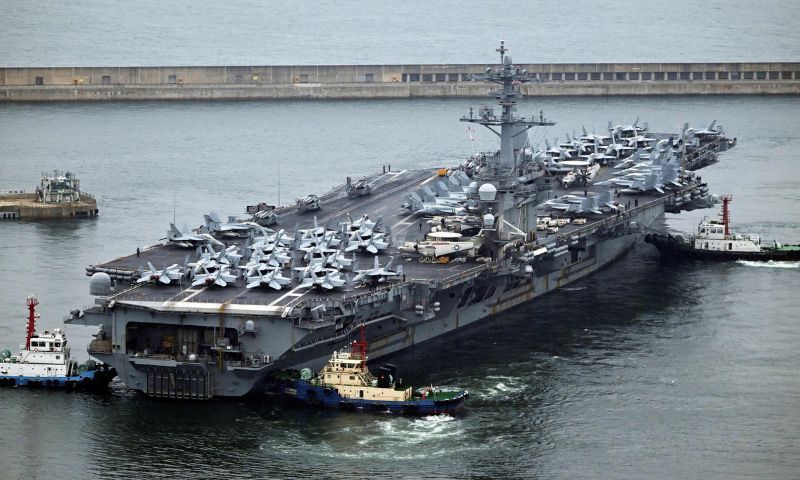WASHINGTON: The United States’ warships and fighter jets are headed to the Middle East to help defend Israel, the US’ closest ally, in case Iran responds militarily to this week’s assassination of Hamas’ top political leader Ismail Haniyeh in Tehran who is widely believed to have been executed by Israeli intelligence agencies.
In response to escalating tensions, the United States has significantly increased its military presence in the Middle East, bolstering support for Israel amid fears of a broader conflict involving Iran. This move follows a series of high-stakes confrontations, including the recent assassination of Hamas leader Ismail Haniyeh, which has heightened regional instability.
The Pentagon announced that it is deploying the USS Abraham Lincoln aircraft carrier strike group to the Middle East, accompanied by additional naval cruisers and destroyers equipped with advanced ballistic missile defence systems. This deployment aims to enhance the defence capabilities of Israel and to prepare for potential retaliatory actions by Iran and its allies.
In a statement, the Pentagon said Defence Secretary Lloyd Austin also ordered additional ballistic missile defence-capable cruisers and destroyers to the European and Middle East regions and is taking steps to send more land-based ballistic missile defence weapons there.
The Pentagon did not say when the various ships and aircraft will be in place, but in a statement Friday it described the moves as necessary to “mitigate the possibility of regional escalation by Iran or Iran’s partners.”
The statement also said the movement of more military capabilities to the region aims “to improve US force protection, to increase support for the defence of Israel, and to ensure the United States is prepared to respond to various contingencies.”
The new orders came just hours after Austin pledged additional support to Israel during a call with Israeli Defence Minister Yoav Gallant.
“The secretary reiterated ironclad support for Israel’s security and informed the minister of additional measures to include ongoing and future defensive force posture changes that the department will take to support the defence of Israel,” Pentagon spokesperson Sabrina Singh said during a briefing.
The strategic increase in military assets comes after a dramatic spike in regional violence. Earlier this week, an Israeli strike in Lebanon resulted in the death of Hezbollah’s top military commander, Fouad Shukur. This attack was followed by the assassination of Ismail Haniyeh, who was in Tehran for the inauguration of Iran’s new president. Haniyeh’s death has been attributed to Israeli intelligence, although Israel has not formally claimed responsibility.
Iran has reacted strongly to Haniyeh’s assassination, with Supreme Leader Ayatollah Ali Khamenei condemning Israel and vowing severe retaliation. “The criminal, terrorist Zionist regime martyred our dear guest in our territory and has caused our grief, but it has also prepared the ground for a severe punishment,” Khamenei posted on social media.
The Iranian government has signaled that it will coordinate a response with key allies, including Hamas, Hezbollah, Houthis, and various militias in the region.
Iranian officials said Thursday they planned to meet with representatives from Iran’s key allies — including Hamas, Hezbollah, Yemen’s Houthis, and militias in Iraq and Syria — to plan their next steps.
“How Iran and the resistance front will respond is currently being reviewed,” said Major General Mohammad Bagheri, Iran’s armed forces chief, speaking on Iranian state TV. “This will certainly happen, and the Zionist regime [Israel] will undoubtedly regret it,” he added.
But US officials have repeatedly signalled that Washington would not leave Israel undefended and would come to its support.
In response to the escalating threat, US President Joe Biden and Israeli Prime Minister Benjamin Netanyahu on Thursday discussed enhanced defensive measures. During their recent conversation, Biden reaffirmed US commitment to Israel’s security and outlined forthcoming defensive deployments aimed at countering threats from ballistic missiles and drones.
A US readout stated that Biden and Netanyahu “discussed efforts to support Israel’s defence against threats, including against ballistic missiles and drones, to include new defensive US military deployments”.
US defence officials Friday likewise emphasized Israel would not stand alone in the face of any Iranian response.
Pentagon spokesperson Sabrina Singh underscored the US stance, asserting, “We will stand with Israel in their self-defence.” The Pentagon’s commitment includes a US Marine Corps amphibious ready group with approximately 4,000 troops already stationed in the region, alongside the USS Theodore Roosevelt carrier strike group, which is expected to leave once the USS Abraham Lincoln arrives.
























